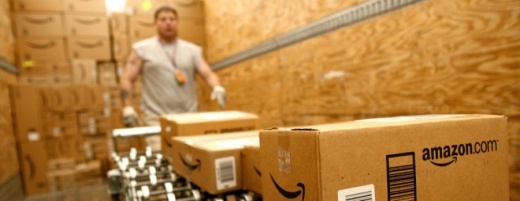Sustainable design elements of Amazon's planned 1 million-square-foot warehouse distribution center were chipped away some during a San Marcos City Council meeting held Jan. 5.
During a Dec. 15 council meeting, Amazon received a parking variance necessary to build the facility as currently planned, and in exchange, the city was to require a list of sustainable design aspects to be included in the facility before a certificate of occupancy would be issued.
Those conditions included 100% solar panel coverage of the roof, charging stations for 10 employee electric vehicles and 10 electric semi-trucks, a hydrogen fuel system, over detention of site runoff, grass-lined channels providing water quality, and a designated ride-share drop-off location.
At issue during the Jan. 5 meeting was the language of the solar coverage requirement. The city has interpreted it to mean that solar panels would need to be installed before a certificate of occupancy would be issued, but Amazon has interpreted it to mean that the roof would simply need to be built to accept future solar panel installation.
During the Jan. 5 meeting, council members voted 6-1 in favor of accepting Amazon's interpretation, which effectively eliminated requirements for the facility to install solar panels. Place 1 Council Member Max Baker was the dissenting vote and was vocal in his opposition to the amended variance agreement.
Baker expressed his doubt to other council members about whether Amazon ever intended to install solar panels and argued that the company was instead changing the agreement with the intent to avoid doing so. He suggested to City Council that it was council's responsibility to use the variance request to tack on design aspects that benefit the community.
"The reason our land development code has requirements like these, with the opportunity for variances, is to give us as council members an opportunity to negotiate for something that's better for our community," Baker said during the meeting. "I think we are failing them by not asking for more solar panels."
Other council members voiced varying levels of opposition to the idea that variance requests were meant to serve such a function.
Place 4 Council Member Shane Scott simply refuted the idea, while Place 5 Council Member Mark Gleason and Mayor Jane Hughson expressed gratitude to Amazon for accepting some sustainability requirements.
"This is going to bring jobs—jobs with health benefits. This is going to promote people to work who want to work there, and I appreciate that they are not asking for an incentive," Hughson told a representative for the development during the Jan. 5 meeting. "Y'all did agree to a number of things when all you were asking for was to move parking places to a different side of the building, so I thank you for that."
One reason sustainability measures were not already required by the city was because a development agreement with Amazon for the warehouse did not exist.
Additionally, Hughson said there was no requirement for the facility to pay wages starting at $15 per hour because there were no incentives associated with the project.
The lack of higher wage requirements was another sore point for Baker.
"We're letting another Amazon come here. They won't be paying great wages, and they're not really making a strong commitment to sustainability," Baker said. "They're putting little pittances in place for us, in my opinion."
However, Place 6 Council Member Melissa Derrick said she believed the economic benefits to the city outweighed Baker's concerns.
"I know that they're more focused on time and speed—on being able to open operations—and this is something that we don't have to pay any incentives towards," Derrick told her fellow council members. "As soon as they're up and running, we'll start making money that day, and with our budget, ... we really need this shot in the arm, and I think we're lucky to have them here."











